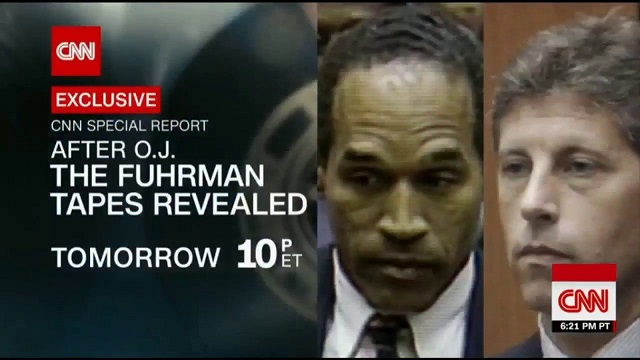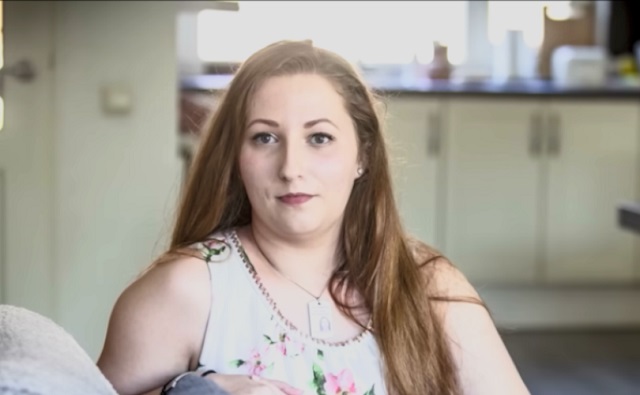COVID-19
Mayor Don Iveson updates Edmontonians on the city’s future shortfalls to the budget

Edmonton Mayor Don Iveson announced on Wednesday April 15, 2020, that the city is taking a massive hit to its revenue streams during this COVID-19 pandemic.
The City is looking to decrease expenditures in a number of areas while they wait for relief from the provincial and federal government.
Here are the top quotes from his press conference;
- “At this morning’s meeting, council was given some financial scenarios as a result of COVID-19, that shows an over $140 million hit (10% of the overall budget) to our revenues by mid-September, and that number grows closer to $260 million by December, in the worst case scenarios,”
- “to avoid deficits or huge tax increases, or massive loss in service delivery or crippling infrastructure cutbacks which will undermine the very economic recovery that we’re trying to stimulate when we can”

- “Because we still do not have certainty for the cost coverage from the province or the federal government, nor is our municipality eligible for the 75% federal wage subsidy, we have had to reduce staff levels, and are likely to further reduce our staff levels, on a temporary basis to cover the growing financial gap.” The city has already laid off 2,000 workers on March 30th
- “We’re going to have to look at delays in infrastructure spending to free up discretionary cash to cover the impacts of COVID on this year budget.”
- “We hope that the provincial and federal infrastructure stimulus when it comes will allow us then to ramp back up without skipping a beat, but I do need to highlight that there is risk to our infrastructure program and our long-term asset conditions because of the need to cut costs”
- Edmonton has sent Alberta government a list of “shovel ready” projects worth $2.1 billion dollars that could create 6,400 constructions jobs plus the trickle down.
Edmonton Mayor Don Iveson’s full news conference from City Hall, April 15, 2020.
Follow this story plus more local news and community coverage on todayville.com
Brownstone Institute
Pfizer Lied to Us Again

From Brownstone Institute
BY
There used to be a time where claims from pharmaceutical companies may have been treated with some degree of skepticism from major institutions and media outlets.
Yet in late 2020 and into 2021, suddenly skepticism turned to complete blind faith. But what changed? Why, political incentives, of course!
Initially, Covid vaccines produced by Pfizer were seen as dangerous and untested; they were considered a Trump vaccine that only idiots who were willing to risk their own health would take. However when the 2020 election had been officially decided, and Biden and his political allies represented the Covid vaccines as the pathway out of the pandemic, a moral choice that would help yourself and others, narratives and incentives changed dramatically.
Pfizer became a heroic symbol of virtue, and all questioning of Covid vaccines was grounds for immediate expulsion from polite society, regardless of the actual efficacy of Pfizer’s products.
Much of the blame for the vaccines’ underperformance could be placed on Pfizer itself; the company relentlessly promoted hopelessly inaccurate efficacy estimates and supported efforts to unnecessarily mandate mRNA shots.
Sure enough, on the back of progressive orthodoxy, corporate and institutional incompetence and media activism, they proudly reported record revenues.
We all know how that turned out in 2022 and 2023.
Skepticism towards Pfizer’s vaccine was obviously quite well warranted. And it turns out that now we, and of course, Pfizer’s chief promoters in the media and public health class should have been even more skeptical.
They weren’t.
Pfizer’s Claims On Covid Treatments Were Wildly Inaccurate
As the Covid vaccines failed spectacularly to stop the spread of infections and did nothing to lessen all-cause mortality or even decrease population level Covid-associated deaths in highly vaccinated countries, Pfizer saw another opportunity.
Sure, their signature product failed to perform as expected. So why not create another one as an antidote?
Enter Paxlovid.
Paxlovid, an antiviral drug, was supposed to help individuals with symptomatic Covid, who’d already been infected, recover more quickly and lessen the risk of severe illness. Sounds great right?
It would appear that it sure did to Anthony Fauci and the cadre of media-promoted “experts.”
Fauci praised Paxlovid in 2022, after the mRNA vaccines and booster doses failed to prevent him from contracting Covid. Bizarrely, Fauci implied that the same Pfizer products that he demanded everyone take would not have been enough to keep him healthy, saying that he believed Paxlovid had kept him out of the hospital.

Never mind, of course, that Fauci had a “rebound” case of Covid-19 after taking Paxlovid and getting vaccinated and boosted. Acknowledging imperfections would undercut his desire to get everyone to take more of his preferred products.
Paxlovid made headlines again later in 2022 as Rochelle Walensky also praised Pfizer’s efforts, despite once again testing positive for “rebound” Covid after Paxlovid treatments.

Even today, the CDC’s own website says Paxlovid is an “effective” treatment for those who’ve contracted the virus and want to avoid severe illness.
There’s just one problem; it’s not true.
A newly released study on Paxlovid on randomized adults with symptomatic Covid; one subset was given Paxlovid (nirmatrelvir-ritonavir) or a placebo every 12 hours for five days, with the intent of determining how effective it was at “sustained alleviation” of Covid-19 symptoms.
In this phase 2–3 trial, we randomly assigned adults who had confirmed Covid-19 with symptom onset within the past 5 days in a 1:1 ratio to receive nirmatrelvir–ritonavir or placebo every 12 hours for 5 days. Patients who were fully vaccinated against Covid-19 and who had at least one risk factor for severe disease, as well as patients without such risk factors who had never been vaccinated against Covid-19 or had not been vaccinated within the previous year, were eligible for participation. Participants logged the presence and severity of prespecified Covid-19 signs and symptoms daily from day 1 through day 28. The primary end point was the time to sustained alleviation of all targeted Covid-19 signs and symptoms. Covid-19–related hospitalization and death from any cause were also assessed through day 28.
Spoiler alert: it wasn’t effective at all.
Their measured results revealed that there was effectively no difference whatsoever in the “sustained alleviation” of symptoms between Paxlovid and a placebo. Those taking Pfizer’s miracle antiviral treatment saw their “signs and symptoms” resolve after 12 days, while the placebo recipients took 13 days.
The median time to sustained alleviation of all targeted signs and symptoms of Covid-19 was 12 days in the nirmatrelvir–ritonavir group and 13 days in the placebo group (P=0.60). Five participants (0.8%) in the nirmatrelvir–ritonavir group and 10 (1.6%) in the placebo group were hospitalized for Covid-19 or died from any cause (difference, −0.8 percentage points; 95% confidence interval, −2.0 to 0.4).
This is the product that to this day is relentlessly promoted by the CDC, the media, and politicians as an effective tool to reduce the severity of symptoms and the length of illness. And it was virtually meaningless.
Even with regards to the most severe outcomes, hospitalization, and death, the difference was negligible. Confidence intervals for the difference in outcome even stretched to a positive relationship, meaning that it’s within the bounds of possibility that more people died or were hospitalized after taking Paxlovid than a placebo.
Succinctly, the researchers confirmed in their summary that there was no difference between the two treatments.
The time to sustained alleviation of all signs and symptoms of Covid-19 did not differ significantly between participants who received nirmatrelvir–ritonavir and those who received placebo.
But who are these researchers, you might ask…surely they’re fringe scientists, desperate to undercut a big, bad pharmaceutical company, right? How else could their conclusions so thoroughly undermine Pfizer?
Let’s take a look at the disclosure to see who funded this study, designed the trial, conducted it, collected the data, and analyzed the results. Surely, that will reveal the nefarious intentions behind this dastardly attempt to cut at the heart of Pfizer’s miracle drug.
Pfizer was responsible for the trial design and conduct and for data collection, analysis, and interpretation. The first draft of the manuscript was written by medical writers (funded by Pfizer) under direction from the authors.
Oh. Oh no.
Pfizer created the trial, conducted it, collected the data, and analyzed it. And it found that Paxlovid made no difference to the resolution of symptoms or with keeping people alive or out of the hospital. That has to sting.
Even worse, Covid vaccination was once again proven to be almost entirely irrelevant where results were concerned. Results were the same between “high-risk subgroups,” meaning those who had been vaccinated but had an elevated risk for more serious symptoms, and those who had never been vaccinated or had received the last dose more than a year ago.
Similar results were observed in the high-risk subgroup (i.e., participants who had been vaccinated and had at least one risk factor for severe illness) and in the standard-risk subgroup (i.e., those who had no risk factors for severe illness and had never been vaccinated or had not been vaccinated within the previous 12 months).
So not only did Paxlovid not make a difference, but vaccination status AND Paxlovid wasn’t enough to create a sizable gap in outcomes between healthy, unvaccinated individuals.
But wait, there’s more.
Viral load rebounds were also more common in the Paxlovid group, and symptom and viral load rebounds combined were more common among those taking Pfizer’s treatment. While percentages were generally low, other studies have pegged Paxlovid-associated rebound as occurring nearly one quarter of the time.
So it’s not particularly effective at reducing symptoms or resolving them more quickly, doesn’t lead to statistically significant improvements in the most severe outcomes, and is more likely to result in a rebound case of the illness it’s supposed to be protecting you from.
Sounds exactly like the type of product that Fauci, Walensky, and the CDC would praise, doesn’t it?
Paxlovid is the entire Covid-pharmaceutical complex summarized perfectly. Created to solve a problem that was supposed to be fixed by another product…understudied, overhyped by the “experts,” and prematurely authorized by a desperate FDA…and ultimately shown to be mostly ineffective.
Once again, the actual science disproves The Science™. And once again, we’ll get no acknowledgment of it or apologies for the billions of taxpayer dollars wasted. Can’t wait to see what Pfizer does for an encore.
Republished from the author’s Substack
COVID-19
Japanese study finds ‘significant increases’ in cancer deaths after third mRNA COVID doses

From LifeSiteNews
Cancer deaths started rising again in Japan in 2021, and one study concludes it ‘may be attributable to several mechanisms’ of the mRNA-based COVID vaccines.
A new study has found “statistically significant increases” in cancer deaths after taking a third dose of mRNA-based COVID-19 vaccines, according to a Japanese study published April 8 in the journal Cureus.
The study looked at age-adjusted mortality rates for multiple types of cancers from 2020 to 2022 in Japanese government data. “No significant excess mortality was observed during the first year of the pandemic (2020),” it says. “However, some excess cancer mortalities were observed in 2021 after mass vaccination with the first and second vaccine doses, and significant excess mortalities were observed for all cancers and some specific types of cancer (including ovarian cancer, leukemia, prostate cancer, lip/oral/pharyngeal cancer, pancreatic cancer, and breast cancer) after mass vaccination with the third dose in 2022.”
Notably, the rollout of the COVID vaccines coincided with an interruption and slowing of declines in cancer mortality rates that had been observed across all age groups over the span of the preceding decade. Third mRNA doses correlated with “significant excess mortalities” of all cancers, including breast, prostate, and ovarian cancer as well as leukemia. Almost all of the COVID vaccines at issue were mRNA-based, with 78% of those being from Pfizer and 22% from Moderna.
“For all cancers, we estimated the excess mortalities to be -0.4% (-0.9, 0.1), 1.1% (0.5, 1.8), and 2.1% (1.4, 2.8), respectively, indicating no excess in 2020 and statistically significant increases in 2021 and especially in 2022,” the authors write.
Changes in 2020 can be attributed to the height of the lockdowns forcing delays and cancellations of surgeries and other cancer treatments, but the researchers note several potential causal links between the vaccines and cancer deaths in 2021 and beyond.
“Some studies have shown that type I interferon (INF) responses, which play an essential role in cancer immunosurveillance, are suppressed after SARS-CoV-2 mRNA-LNP vaccination,” they write.
“SARS-CoV-2 vaccine has been shown to cause immunosuppression and lead to the reactivation of latent viruses such as varicella-zoster virus (VZV, human herpesvirus 3; HHV3) or human herpesvirus 8 (HHV8) in some cases,” the add. “These phenomena could also help explain the excess deaths from lip/oral/pharyngeal cancer in 2022 when mass vaccination with third and later doses was underway.”
The researchers conclude that “[t]hese particularly marked increases in mortality rates of these ERα-sensitive cancers may be attributable to several mechanisms of the mRNA-LNP vaccination rather than COVID-19 infection itself or reduced cancer care due to the lockdown. The significance of this possibility warrants further studies.”
“I have long suspected a cancer link to the vaccines just based on the science of immunology,” MIT researcher Stephanie Seneff told The Epoch Times in response to the study. “What I think is happening, broadly speaking, is that the vaccine is causing impairment of the innate immune response, which leads to an increased susceptibility to any infection, increased autoimmune disease, and accelerated cancer progression.”
A significant body of evidence links significant risks to the COVID vaccines, which were developed and reviewed in a fraction of the time vaccines usually take under former President Donald Trump’s Operation Warp Speed initiative. Among it, the federal Vaccine Adverse Event Reporting System (VAERS) reports 37,382 deaths, 215,734 hospitalizations, 21,616 heart attacks, and 28,299 myocarditis and pericarditis cases as of March 29, among other ailments. U.S. Centers for Disease Control & Prevention (CDC) researchers have recognized a “high verification rate of reports of myocarditis to VAERS after mRNA-based COVID-19 vaccination,” leading to the conclusion that “under-reporting is more likely” than over-reporting).
In 2021, Project Veritas shed light on some of the reasons for such under-reporting with undercover video from inside Phoenix Indian Medical Center, a facility run under the U.S. Department of Health & Human Services’ Indian Health Service program, in which emergency room physician Dr. Maria Gonzales laments that myocarditis cases go unreported “because they want to shove it under the mat,” and nurse Deanna Paris attests to seeing “a lot” of people who “got sick from the side effects” of the COVID shots, but “nobody” is reporting them to VAERS “because it takes over a half hour to write the damn thing.”
An analysis of 99 million people across eight countries published February in the journal Vaccine–the largest analysis to date–“observed significantly higher risks of myocarditis following the first, second and third doses” of mRNA-based COVID vaccines, as well as signs of increased risk of “pericarditis, Guillain-Barré syndrome, and cerebral venous sinus thrombosis,” and other “potential safety signals that require further investigation.” Earlier this month, the CDC was forced to release by court order 780,000 previously undisclosed reports of serious adverse reactions.
In Florida, a grand jury impaneled by Republican Gov. Ron DeSantis is currently investigating the manufacture and rollout of the COVID vaccines. In February, it released its first interim report on the underlying justification for Operation Warp Speed, which determined that lockdowns did more harm than good, that masks were ineffective at stopping COVID transmission, that COVID was “statistically almost harmless” to children and most adults, and that it is “highly likely” that COVID hospitalization numbers were inflated. The grand jury’s report on the vaccines themselves is highly anticipated.
-
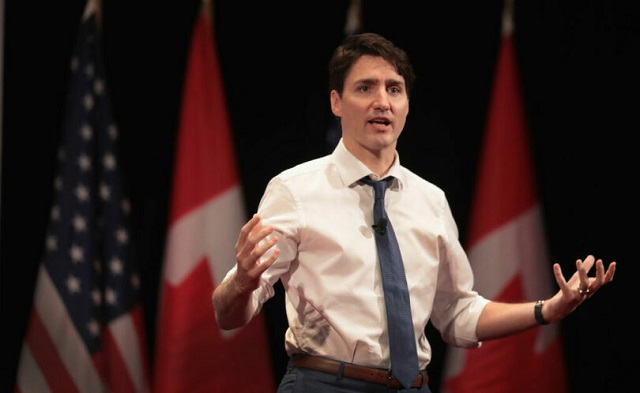
 National2 days ago
National2 days agoTrudeau’s 2024 budget includes $150 million to promote ‘2SLGBTQI+’ ideology at home and abroad
-

 armed forces2 days ago
armed forces2 days agoCanada’s first ‘transgender’ military chaplain suspended for alleged sexual harassment
-

 Alberta2 days ago
Alberta2 days agoCoutts Three verdict: A warning to protestors who act as liaison with police
-

 Energy2 days ago
Energy2 days agoCanada Has All the Elements to be a Winner in Global Energy — Now Let’s Do It
-
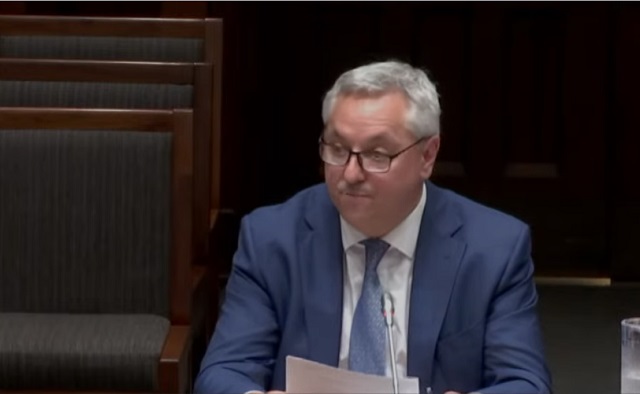
 espionage1 day ago
espionage1 day agoCanada’s intelligence chief says he personally warned Trudeau about China’s election meddling
-

 Opinion1 day ago
Opinion1 day agoFemale athletes are turning against gender-confused men dominating women’s sports
-

 Censorship Industrial Complex1 day ago
Censorship Industrial Complex1 day agoScotland’s crazy anti-hate law may be sign of things to come here
-
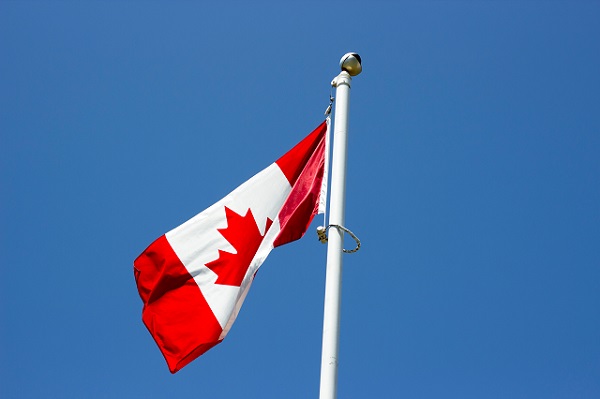
 Business1 day ago
Business1 day agoHigher Capital Gains Taxes cap off a loser federal budget


